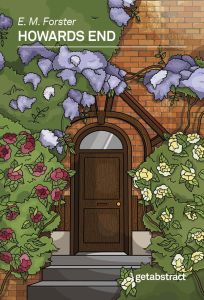
Howards End
- Novel
- Edwardian Era
What It’s About
No Escape
Howards End is a finely nuanced depiction of the relationships among three families from drastically different backgrounds and world views. Their paths cross and intertwine throughout the novel, with fatal consequences. The novel questions the rigid class system and the moral hypocrisy of early 20th-century patriarchal society, but in the end paints a rather bleak picture of the ability either to overcome class barriers or escape gender stereotypes and roles. For example, Leonard Bast has to give up his ambition at bettering himself and ends up ruined, whereas strong, independent and confident Margaret in the end steps into (and accepts) the role of wife and companion to the hypocritical and complacent Henry. It seems there is no escape from the rules and boundaries of society.
Summary
About the Author
Edward Morgan Forster was born on January 1, 1879 in London. His father died early, and from age two, he grew up in the sole care of his mother. The sensitive Forster had a tough time with his schoolmates, escaping into the world of literature. It wasn’t until he started studying the classics at King’s College, Cambridge, that he began forming friendships. Many of these were sadly marked by misunderstandings due to Forster’s homosexual tendencies. After finishing his studies, he traveled through Europe with his mother. This experience inspired his first novel, Where Angels Fear to Tread, which was published in 1905. Further novels followed, including A Room with a View (1908) and Howards End (1910). During the 1910s and 1920s, he was a member of the legendary Bloomsbury Group. In 1907, he met the Indian nobleman Syed Ross Masood and fell in love with him. His feelings were unrequited, but he refused to give up. In 1912, he visited Masood in India. It was during this trip that he started A Passage to India, though he only finished the novel ten years later after he his second visit to the country as the private secretary of the Maharajah of Dewas. A Passage to India was to be Forster’s last novel, and it won him several prizes. After its publication, he went on to become a literary critic and successful broadcaster on BBC Radio. He continued to live with his mother until her death in 1945. In 1946, Forster became an Honorary Fellow at King’s College, which allowed him to live there without any obligation to teach during the last 24 years of his life. As a staunch democrat, he turned down a knighthood, but was made a Companion of Honour in 1953. Only his closest friends knew about Forster’s homosexuality, and his homoerotic novel Maurice wasn’t published until 1971, one year after he died of a stroke at the age of 91 in Coventry.








Comment on this summary